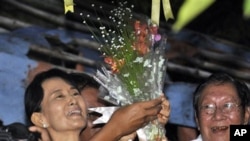World leaders are lauding the new-found freedom for Burmese democracy advocate Aung San Suu Kyi, who was released Saturday from house arrest in Rangoon.
U.S. President Barack Obama called her "a hero of mine" and said the 65-year-old Nobel Peace Prize laureate is an inspiration for human rights activists in Burma and throughout the world. He said the release of Aung San Suu Kyi, confined by Burma's military rulers for 15 of the last 21 years, was "long overdue" and called on the Burmese government to release all of its 2,200 political prisoners.
The Elders, a group of retired world leaders, welcomed her freedom as well. The leader of the group, Archbishop Desmond Tutu of South Africa, said she is "a global symbol of moral courage."
British Prime Minister David Cameron called Aung San Suu Kyi "an inspiration for all of us who believe in freedom of speech, democracy and human rights."
While praising her release, other leaders warned that they would be watching to see the extent of her freedom granted by the military rulers and how they deal with Burma's remaining political prisoners.
French President Nicolas Sarkozy said that any restriction on her freedom "would constitute a new, unacceptable denial of her rights."
Former Irish President Mary Robinson said that Aung San Suu Kyi's long detention had silenced "the will of the people" who had overwhelmingly supported her National League for Democracy in the country's 1990 election, only to see the military refuse to let the party assume power. With political dissidents still imprisoned, she said "little seems to have changed."
China had no immediate reaction to Aug San Suu Kyi's release. Chinese officials have repeatedly denounced the Nobel committee for awarding this year's peace prize to Chinese human rights and democracy advocate Liu Xiaobo, now serving an 11-year sentence for subversion against the Chinese government.
Some information for this report was provided by AP, AFP and Reuters.
Timeline of Major Political Events in Burma




